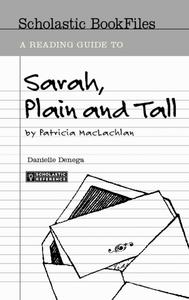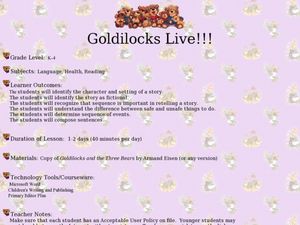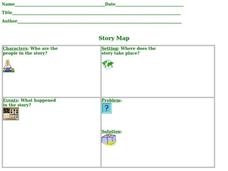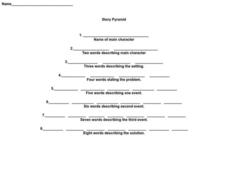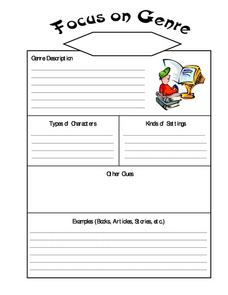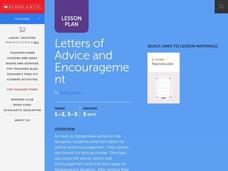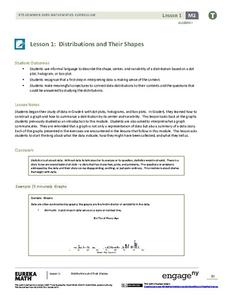Curated OER
Literary Analysis - Young Goodman Brown
Why is literary analysis so important? Readers explore writing a literary analysis by reviewing literary elements such as character, metaphor, plot, setting, simile, personification, and style. They read "Young Goodman Brown" by...
Scholastic
A Reading Guide to Sarah, Plain and Tall
Eliminate the hard work of creating an entire literature unit with this reading guide for the novel Sarah, Plain and Tall. From background information about the author and her motivation for writing the story to reading comprehension...
Curated OER
Children's Books Teach Diversity, Respect
Students compare aspects of children's books that teach diversity and respect. They examine universal values such as courage and bravery, respect and apathy. They create a final project based on their ability to recognize the values in...
Curated OER
When A Story Met A Sandwich
How is a story like a peanut butter and jelly sandwich? Use making a sandwich as a metaphor to remind your writers that a good, solid beginning, a rich and rewarding middle, and an ending that brings everything together spices up a...
Curated OER
Goldilocks Live!!!
Study story elements with your young learners. Read Goldilocks and the Three Bears and discuss the order of events by making a story panel out of butcher paper. Sentences are given as suggestions for the panel, though you may compose...
Curriculum Corner
Fiction Organizer
Teach your youngsters about the elements of plot with this handy graphic organizer. Pupils note down the main character, the setting, the problem, and the solution of any fictional story they read.
Do2Learn
Story Organizer
Kids can get all their plot points in line by filling out this graphic organizer with information from a story they have read. Pupils note down the title and author, the characters, the setting, and four events from the story.
Curated OER
Express Yourself Lesson Seed 9: Climax
Conduct a close reading of chapter 9 of The Cay. Read the chapter again and ask pupils to respond to a list of included text-dependent questions. Finish the class with the provided writing assignment, which asks learners to use textual...
Curated OER
Touching Spirit Bear: Chapter 3
In this Touching Spirit Bear comprehension check worksheet, students respond to 16 short answer questions covering chapter 3 of Touching Spirit Bear in order to help them better understand the chapter and the novel.
Curated OER
Story Map
In this graphic organizer worksheet, students read a story and then answer questions. They list the main characters, describe the setting, main events, problem and the solution in the story. This graphic organizer is one page in length.
Curated OER
Eudora Welty's "A Worn Path" in Graphical Representation
Learners analyze graphical forms of Eudora Welty and interpret the shorts stories in the representations. In this graphical representations lesson, students analyze the short story genre in comic strips. Learners then create their own...
Curated OER
"Et tu, Brute?" - The Characters, Conflict and Historical context of Shakespeare's Julius Caesar
Students analyze the Shakespearian play, "Julius Caesar" in this seven lesson unit. Through readings, hands-on projects, and the study of plot development, comparisons are made to the movie and the historical records available.
Curated OER
Story Pyramid
In this story pyramid worksheet, students read a story and then fill in the blanks which will give the main idea of the story. Students identify the main characters, describe the characters, setting, problem, and main events. Eight...
Curated OER
Roll of Thunder, Hear My Cry - Chapter 1 Questions
In this Roll of Thunder, Hear My Cry comprehension check worksheet, students respond to 16 short answer questions pertaining to the characters and setting of the novel.
Curated OER
Focus on Genre
In this focus on genre worksheet, students describe the genre they are reading, types of characters, kinds of settings, and examples of other forms of the same genre. Students answer five short answer questions.
Curated OER
Creative Writing Idea Sheet
In this creative writing ideas activity, students create their own stories as they use the setting, character, and objects listed on the activity to fuel their ideas.
Curated OER
Letters of Advice and Encouragement
Students review the format for a letter. They discuss advice and encouragement and generate examples of each. Students write a letter to Despereaux. They proofread their work and a partner's work. Students discuss symbols and make a...
Curated OER
STORY GRAMMAR
In this story grammar worksheet, students are asked to describe the setting, main characters and events from their book in short-answer form.
EngageNY
Distributions and Their Shapes
What can we find out about the data from the way it is shaped? Looking at displays that are familiar from previous grades, the class forms meaningful conjectures based upon the context of the data. The introductory lesson to descriptive...
Reed Novel Studies
The Mouse and The Motorcycle: Novel Study
A mouse on a motorcycle—what could possibly go wrong? Using the novel study that accompanies Beverly Cleary's The Mouse and the Motorcycle, pupils complete a brief vocabulary activity and then answer questions about the text. Next, they...
Curated OER
Points of View
Cinderella is a classic love story when Cinderella is the protagonist—but what happens if a stepsister tells the story? Focus on point of view with a lesson about fairy tales and story elements. After reading a few familiar fairy tales,...
EngageNY
Analyzing Word Choice: Understanding Working Conditions in the Mills
Ravenous or hungry, happy or ecstatic—why does word choice matter? Scholars continue to analyze working conditions in the mill and how the conditions affect the protagonist of Katherine Paterson's novel, Lyddie. They engage in a close...
EngageNY
Introducing Working Conditions in the Mills
Scholars discover how working in a textile mill in the nineteenth century affected the title character from Katherine Paterson's novel, Lyddie. Partners analyze quotes from the novel and then add evidence and questions about working...
EngageNY
Analyzing Textual Evidence: Working Conditions in the Mills
Deafening, dusty, debris. Such were the working conditions in the 1800s textile industry as portrayed in Katherine Paterson's novel Lyddie. Scholars watch a short video clip about life and work in the mills. Next, they work with partners...
Other popular searches
- Setting Plot Main Characters
- Plot, Characters and Setting
- Plot Characters and Setting
- Setting Plot Characters



